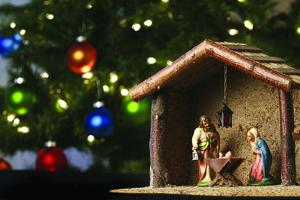The lectionary readings are here or individually:
I. Theme – God’s Call and Response to us, being sent out on mission
First Reading – Isaiah 66:10-14
Psalm – Psalm 66:1-8
Epistle – Galatians 6:(1-6)7-16
Gospel – Luke 10:1-11, 16-20
Today’s readings focus on the Christian experience of being sent by Jesus to continue his mission. This Sunday’s lectionary readings reflect on God’s call and our response, and how this affects the shape of grace and healing in our lives.
Isaiah speaks words of peace and hope for God’s people because God’s love never fails. Paul closes his letter to the Galatians with some final counsel on behavior within the Christian community. Luke tells of the mission of the 70 disciples and their success in defeating Satan.
How do we live out God’s faithfulness in our lives? How do we witness to others? When we read of the message to the seventy, Jesus is not calling them out to condemn and cause fear but instead to heal and proclaim Good News. God has brought Good News through Jesus Christ, but it is human beings who have drawn the dividing lines. It is human beings who will not receive the message of peace, who turn away from God’s love, who restrict and condemn others. God desires restoration, healing, and forgiveness, and offers us new life, if we choose to accept
Transformation emerges through a dynamic process of divine-human call and response. Our openness and efforts make a difference to the quality and extent of God’s presence in our lives. As scripture says, Christ is always standing at the door, knocking and seeking our attention and partnership in the quest for planetary and personal wholeness. Whether and how we the open the door to God’s graceful, intimate, and visionary energy can make all the difference in the world.
The central message this week is simple but significant – do not despise the saving power of small things. God’s commitment to justice, restoration and healing is proclaimed strongly through the Psalms and Isaiah’s song, but the way God’s saving work comes into being is often through small, ordinary people and actions
The picture of God’s care and comfort in Isaiah is that of an ordinary, familiar domestic scene – a child being nursed by its mother. Galatians speaks about the work of following Christ in the every day terms of our relationships with one another (correcting each other and sharing burdens), taking responsibility and doing good for all. And Jesus sends his disciples out to share the message of God’s reign, while accepting hospitality along the way – a very ordinary practice for travelers. Even when they celebrate overcoming demons, Jesus downplays it.
The power of the church to bring wholeness to society is in the grace, kindness and mutual encouragement that comes form living as the letter to the Galatians instructs. And, in every individual, the willingness to receive God’s grace and healing through ordinary means frees us to become channels. Our impact is often less about how we structure our services or what kind of music we use or how “prominent” we are in our community. Often it is in the quiet work of nurturing care and service within our community, and in doing the slow, transformative work of growing into caring, serving Christ-followers in our homes, workplaces and sports clubs (as Galatians calls us) that ultimately determines how effective our ministry is.
When, instead of pointing fingers at “the world” we are willing to accept its “hospitality” speaking blessing, and offering grace and mercy and justice in every situation and with every person (as the disciples were called to do), then people begin coming to us to learn more about our faith and the One we follow. But, if we fail to do this, then no amount of words or programs will be enough to compensate for our lack of grace and goodness. It’s significant that, even when the disciples were told to “shake the dust off their feet” when they were not received in a village, they were, nevertheless instructed to tell the people that God’s Reign had come to them. It was not that they were “judging” the people, so much as using a graphic and powerful image to challenge them about what they had rejected. God’s love and grace remained available to the people. In the same way, we can confront the small injustices in our communities, while still offering grace. And, in the end, what is important is not the dramatic confrontations, but the people whose names are “written in heaven” – who have discovered life in the dream of God.
In practical terms, this move toward “ordinary justice” has very significant implications. If we are to reverse the impact of climate change, it will take small but significant shifts in the habits of many ordinary people. If our world is to become more peaceful, it will mean ordinary people must learn to understand and respect one another, recognizing our common humanity. If wealth is to be equitably distributed, it will mean changing the values by which ordinary individuals live from consumerism to simplicity and from accumulating to giving. If these shifts were just taken seriously by Christ-followers alone, the impact would be nothing short of miraculous. As Christians around the world join together in peace-making, hospitality, taking responsibility for the change we can bring and doing small acts of goodness, the Gospel message is preached clearly and powerfully, with very few words necessary.
The one reading that appears to be out of place is the alternative Psalm (66) – but here the focus is on the Exodus, which, although proclaimed through retelling the miraculous story, is about the very ordinary human longing for liberation and salvation – which is, of course, the essence of the message that Jesus’ disciples would have preached.
II. Summary
First Reading – Isaiah 66:10-14
Background – It’s hard to pin down the context and author of this passage, from the third great division of the book of Isaiah, chapters 56-66. It would make sense to assume that some godly person spoke this to exiles returning from the Babylonian Captivity. (That was the period, also called the Exile, when many, but not all, residents were taken away from Judea and held in Babylon for a couple of generations in the sixth century B.C.E. We know from the second part of Isaiah, chapters 40-55, that the rebuilding of their hometown Jerusalem was disappointingly slow.)
Apparently the people were losing faith that God would restore things for them, for the prophet is almost defensive in his assertion “the Lord’s power shall be known to his servants.” And the imagery is quite extravagant. It’s as if the prophet himself is whistling in the dark, to stave off doubt and despair.
Today’s reading develops the image of Jerusalem as the once desolate mother who in the end-time will be the source of all joy and nurture. Its structure is like that of a psalm where an initial idea (joy) is contrasted in the next strophe with opposite idea (mourning
Isaiah 66 explicitly uses feminine imagery to refer to God. As Isaiah often does, Yahweh’s tender care for the people is compared to that of a comforting mother (42:14, 49:15, 66:9). This image of God as a mother carrying her child, comforting a child who is sad or hurt is extremely nurturing and needed for a community that was coming out of exile. Yahweh’s covenant bond is rooted in a love that never fails. The desolate and discouraged people will be comforted and their sadness will turn to joy.
Jerusalem is also seen as a nursing mother caring for her children. The people who have been in exile are like lost children, who have been searching for their mother, but their mother, God, has also been searching and waiting for them. God has not forgotten them, and God will rejoice with them.
Verses 15 and 16 are an oracle of judgment upon the lord’s enemies, who are the idolatrous in Israel (v. 17) rather than the Gentiles, who will come to worship God (66:18-23). God’s judgment will be carried out by fire and sword.
Psalm – Psalm 66:1-8
Psalm 66:1-9 recalls God’s deliverance of the people from Egypt, and they recall this deliverance in song and praise. This is the God of the living, the God of life, who restores life when it is taken, who renews all things. The people remember God’s acts of deliverance in history and find hope in the stories of old. It is a psalm that centers on God, and the foundational acts of Israel as a people.
This psalm of praise and thanksgiving is divided into several parts, which may have been composed or used at different times. The first part (vv. 1-4) is a hymn to God. All of the earth is invited to sing praise to God Verses 5-12 give thanks for the deliverance of people through God’s saving power, as shown in the crossing of the Red Sea and/or the Jordan (v. 6). The acts of God were not just past history but were made present through recollection and reenactment in the liturgy. So the exodus events became a way to understand the return from exile in Babylon (vv. 10, 12). Likewise for Christians, this psalm speaks of participation, through baptism, in Christ’s resurrection.
Epistle – Galatians 6:(1-6)7-16
Galatians 6:1-16 ends our series of readings from Paul’s letter to the churches in Galatia. Paul has been arguing against those that have received the false Gospel, that requires Gentile converts to keep to the Jewish law first, and Paul has been angry with leaders such as Peter who have been hypocrites about what they practice and how they are seen.
Leaving behind the discussion and arguments concerning freedom and the law, Paul turns to issues of practicality within the Christian life: a) dealing with those who have transgressed (Paul argues for “gentleness” and taking up another’s burdens.
This means to restore one another with a spirit of gentleness (in other words, to forgive) understanding and the sharing of difficulties, to work together for the good of all. b) “Sowing good – in the Spirit”, arguing that we should in our works of righteousness do that which is right, working for the good of all, and c) Knowing that in which to take pride. He warns that it is not born of the traditional pride of circumcision, but rather the cross of Christ.
Paul’s blessing to them is that they remain strong in Christ, and that all are a new creation in Christ, where the law, where the divisions of Jew and Gentile, male and female, slave and free do not exist any longer. Christians are submitted to “the law of Christ,” not a legal code but a Persno
Paul urges the community to provide for its teachers and to persevere in doing good. He summarizes the theme of the letter, declaring that it is participation, not in circumcision, but in crucifixion with Christ (2:19, 5:24) and thus in the new creation, which is the Christian’s only glory. This is the true continuity with the past. Those, both Jew and Gentile, who follow Christ, are the true chosen people, “the Israel of God.”
Paul himself bears the evidence of this commitment to Christ; the word translated “marks” is in Greek stigmata, meaning a scar (2 Corinthians 4:8-10) or a slave’s brand of ownership. The use of stigmata to refer to the marks of the crucifixion came much later. He closes the letter, which began so harshly, with a blessing upon the recipients.
Gospel – Luke 10:1-11, 16-20
The larger reading is made up of five smaller units: a) Instruction for “the Seventy” (verses 1-12), b) The Impenitent (not in our reading, excepting verse 16) (verses 13-16), c) The Seventy return (verses 17-20), d) a Thanksgiving (not in our reading) (verse 21), and e) Blessings (verses 22-24 also not in our reading). Our reading focuses in on the mission of the seventy and what the learned in their service.
The first part, the mission of the 70 disciples, is recorded only by Luke. This reading recalls a similar mission of the “Twelve” in the previous chapter ( Luke 9:1-5). What is the meaning of the numbers? The twelve are the disciples, of course, their number symbolic of Israel. The number seventy (“seven” denoting perfection, and the multiplication by ten indicating a great number) was a term used to describe “the Nations”. Thus these couples are sent out to all the world.
Luke understands their mission as foreshadowing the later mission of the Christian community to the world. They are to go out two by two as witnesses into the harvest, the final gathering of God’s people. They are to rely upon God to protect and provide for them.
Jesus sent 70 disciples out to towns he was about to visit, warning them he was sending them out “like lambs into the midst of wolves.” Jesus was able to survey that sorry landscape, the dusty roads, abject poverty and skeptical people and see a golden field, glowing richly with harvest. He tries to convey his vision to his followers, makes them his forerunners, and instructs them in actions he himself would be likely to take.
There are practicalities to be observed: simplicity, focus, observation, and thankfulness . They are to travel light and bring peace to each household they visit. They come bringing no goods with them, nor an agenda, but simply to say, “Peace to this house! If they are not received, they are to wipe the dust off of their sandals, which Jesus already told the twelve to do in their previous mission in 9:1-6.
They should be adaptable, following local eating and drinking customs, not demanding special treatment. Curing the sick, they should encourage people that God’s reign was close enough to touch, even in their midst. Their primary message, then is one of healing and encouragement.
This passage today contains also when the seventy have returned. They are called to go and share the Good News and to do deeds in the name of Jesus that proclaim that Good News. They are not called to condemn, or to preach hellfire and brimstone like John but rather leave the worrying about who receives the message of God’s love up to God. That’s not their concern. Their concern is to do the Good News: to preach, heal, bless, and bring the message of peace.
Rejection, it appears, was not to change the focus of the journey – namely the message that the kingdom of heaven was at hand. Jesus counsels persistence and non-attachment. Your work is not about your success or achievement but faithfulness to God and the well-being of those whom you serve. If people treat you well, be faithful, and let the power of God flow, enriching and deepening their lives and possibly even transforming their bodies and social standing. If people turn their back on you, scorning your message, continue on your journey, letting go of any sense of failure or desire for revenge. We are responsible for the fidelity of our message and our spiritual well-being; the rest is up to the gentle providence of God and the decisions of those to whom we minister.
We can reasonably assume from this scripture that the disciples also had some bad experiences, although Luke reports only the disciples’ immediate success, from which they returned in joy. Jesus told them their joy was misplaced. The divine protection and power they experienced was only a fringe benefit. True joy comes from knowing “that your names are written in heaven.” Furthermore, he gives them a steely strength from which to draw. They are empowered to do great deeds, to confront evil and remain unharmed.
Their urgency calls attention to the belief in the nearness of the promised end times, and their poverty and peaceableness echoes that urged by Jesus in the Sermon on the Plain (Luke 6:29-49). For Luke, “peace” is particularly associated with the salvation Jesus brings (1:79, 2:14, 29, 7:50, 8:48, 19:38). There is to be no quibbling over dietary rules (such was an issue in the Gentile mission, for example in Acts 11:1-18, Galatians 2:11-14 and 1 Corinthians 10:25).
The disciples proclaim Jesus’ own message, “the kingdom of God is at hand for you” (10:9, 11, 11:20), rather than the Christian post-Easter proclamation about Jesus. The final defeat of Satan that will characterize the end times is foreshadowed by their mission and begins to occur because of it.
 Rediscovering the love of God this Christmas- a one minute video from the Acts8Movement of the Episcopal Church
Rediscovering the love of God this Christmas- a one minute video from the Acts8Movement of the Episcopal Church 
 Origins of 30 Christmas Carols
Origins of 30 Christmas Carols
 Unlikely Christmas Carols: Bruce Cockburn’s “Cry Of A Tiny Baby”
Unlikely Christmas Carols: Bruce Cockburn’s “Cry Of A Tiny Baby”











